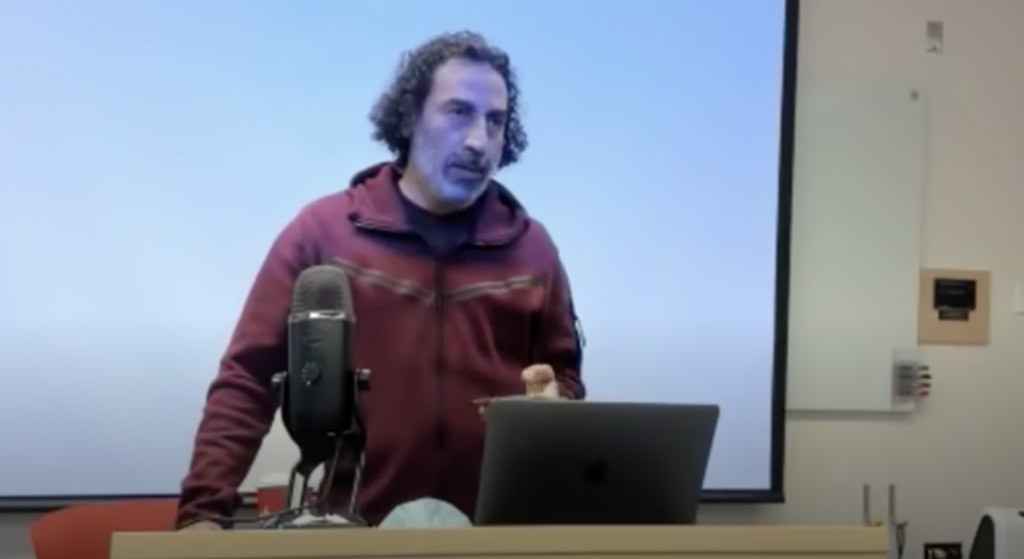
Bob Mackin
The director of the University of B.C.’s Institute for Gender, Race, Sexuality and Social Justice (GRSJ) arranged space last May for a Vancouver lecture by a federally funded activist with a history of antisemitic comments.

UBC professor Leonora Angeles (UBC/SCARP)
UBC’s West Mall Annex at the School of Community and Regional Planning (SCARP) hosted Laith Marouf of the Community Media Advocacy Centre (CMAC). The federal Liberal government granted $134,000 for Marouf to hold Building an Anti-Racism Strategy for Canadian Broadcasting seminars in six cities, but cancelled the contract after media attention last August to Marouf’s myriad comments against Jews, French-Canadians and Americans.
At the May 14 event, Marouf thanked SCARP for “in-kind contributions,” called Israel’s government “the Zionist apartheid regime,” referred to “the colony of Canada” and accused the media of upholding white supremacy and genocide.
The event happened just three weeks after UBC released then-President Santa Ono’s anti-racism task force report.
Last August, a prepared statement from the university denounced antisemitism, denied SCARP was a sponsor and said an unnamed faculty member helped book the venue.
Correspondence obtained via freedom of information showed the faculty member was Leonora Angeles, who had been a professor at SCARP before joining GRSJ.
Angeles told SCARP director Heather Campbell and communications coordinator Kyle Mallinson in an Aug. 22, 2022 email that she was “more than happy to talk to media for what it is worth, and clarify SCARP was not a sponsor of this event and we are not interested in harbouring antisemitic sentiments.”

Laith Marouf, UBC May 14 (credit CMAC:Internet Archive)
Angeles explained that the organizers “approached me for a favour.” Specifically, a social work professor at Carleton University, whose name she omitted, sought a venue at a “reasonable price as their budget is limited.” She offered the West Mall Annex.
“There is really no news there but we live in very strange times,” Angeles wrote. “It seems there is interest in some circles to identify who are the people and places identified with the project and if they are harbouring any antisemitic sentiments.”
Angeles also helped promote Marouf’s appearance. Three days before the event, she asked Mallinson to “please kindly invite our faculty, students and staff.”
“I think media outlets will milk this thread for what is worth,” Angeles said in the Aug. 22 email.
“Thanks for the context Nora,” Mallinson replied. “It’s very possible that this reporter was trying to create a story by getting us to respond.”
The next evening, UBC Applied Science marketing director Wendy McHardy circulated an “approved statement” that was later provided to the reporter, distancing UBC from the event and “the abhorrent views that have been expressed by one of its speakers.”
“The event was not an official SCARP event, nor was it sponsored in any way by SCARP,” the statement said. “Centrally booked events are assessed for safety and security, as well as hate speech.”

UBC’s Heather Campbell (left), Kyle Mallinson and Wendy McHardy
In an Aug. 24 email to McHardy and Faculty of Applied Science Dean James Olson, Campbell said SCARP was already reviewing the process for faculty to book rooms for external groups.
“While I wouldn’t say this publicly, in all honesty, I’m not sure it would have made any difference in this case, when you look at the nature of the event, including folks from Indigenous radio etc., but there’s never any harm in reviewing policies,” Campbell wrote. “I certainly have no intention of speaking to any reporters.”
She said she had not raised this matter with other faculty at SCARP, but assumed their reactions would be the same as hers: “complete ignorance.”
“I’d also expect that they’d refer any SCARP-related approach from a reporter to me,” Campbell said.
Neither Angeles nor Campbell responded to interview requests. Likewise for Marouf.
Last September, Marouf accused the “Zionist lobby” and Prime Minister Justin Trudeau of falsely claiming his Tweets were hate speech.
On Monday, a senior bureaucrat told a House of Commons committee that the Department of Canadian Heritage hired a collection agency because there is “strong interest” in clawing back the $122,661 paid to CMAC.
Associate Deputy Minister Mala Khanna said the department terminated CMAC’s contract on Sept. 23, after a 30-day suspension. Since then, department policies changed.
“Applicants are now asked to certify, in-writing, that they will not undermine the anti-racism strategy, and will respect the Canadian Charter of Rights and Freedoms and the Canadian Human Rights Act,” Khanna said. “The minister now has the option to immediately terminate a contract.”
Support theBreaker.news for as low as $2 a month on Patreon. Find out how. Click here.











